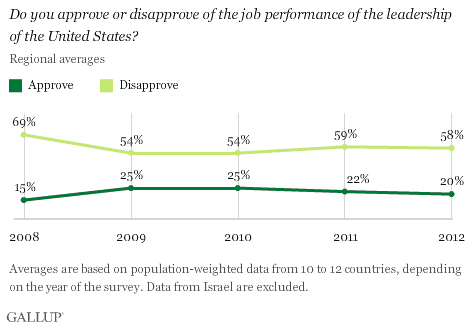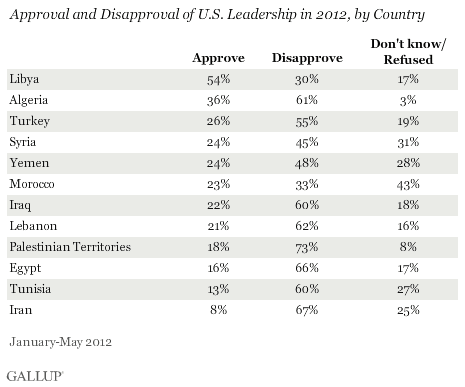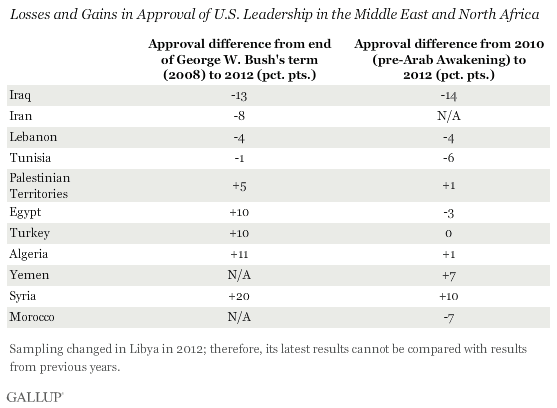WASHINGTON, D.C. -- Approval of U.S. leadership in the Middle East and North Africa (MENA) region was already slipping before the recent wave of anti-U.S. protests across the region. An average of 20% of adults across 12 MENA countries Gallup surveyed between January and May 2012 approved of the job performance of the leadership of the U.S. This rating was down from 22% in 2011 and 25% during the first two years of President Barack Obama's term.

The image of U.S. leadership in the region in early 2012 is still better than the 15% average in the last year of the George W. Bush administration. Overall, the decline in U.S. leadership approval in the MENA region is in line with a gradual downward trend in U.S. leadership support since 2009.
Libyans' Views Underscore Complexities of MENA's Relations With the U.S.
The case of Libya reveals some of the complexities in U.S. ties with MENA countries. In spring 2012, the 54% approval of U.S. leadership in Libya was one of the highest ratings Gallup has ever recorded in any MENA region country. Still, only a few months later, protests erupted there against a video produced in the U.S. that disparaged the Prophet Muhammad and an attack on the U.S. Consulate in Benghazi claimed the lives of four Americans including the U.S. ambassador.

In all other MENA countries, minorities approved of U.S. leadership, ranging from 36% in Algeria to 8% in Iran. Disapproval was highest in the Palestinian Territories (73%).
Withdrawal From Iraq Does Not Result in Higher U.S. Approval
In the majority of MENA countries surveyed, U.S. leadership was more popular in 2012 than in 2008. Approval increased most notably among Syrians (20 percentage points), albeit from a low level (4%). The 24% approval rating is up nine points from spring 2011, possibly attributable to the U.S. administration's diplomatic support of the uprising in Syria.
Results from Iraq and Iran defy this trend. Obama's decision to withdraw U.S. troops from Iraq by the end of 2011 did not net higher approval of the U.S. leadership among Iraqis. On the contrary, approval of U.S. leadership in the country dropped by 14 points since 2010 to 22% in 2012. The drop was steepest in Iraqi Kurdistan. While in 2010 a majority (62%) in Iraqi Kurdistan supported U.S. leadership, by 2012 the proportion of supporters shrank to a third (34%). Perhaps this loss in approval can be attributed to concerns among Iraqis living in Kurdistan about the effects of the withdrawal of U.S. troops on their security.

The Arab Awakening that started in late 2010 in Tunisia appears to have had mixed effects on support for U.S. leadership across the region. For example, while Tunisians' and Moroccans' approval ratings dwindled since 2010 (decreasing by six and seven points, respectively), approval increased in Syria (10 points) and in Yemen (seven points).
Implications
Many in the MENA region were hoping for better relations with the U.S. when Obama took over the U.S. presidency from George W. Bush in January 2009. In his famous Cairo speech in June 2009, Obama called for a "new beginning" in ties and the end of a "cycle of suspicion and discord." Gallup registered upswings in U.S. approval ratings across the MENA region in its polls following the speech. However, in some countries, this enthusiasm was only short-lived, with approval decreasing further in 2012.
The latest incidents surrounding the controversial film and the ensuing, at times violent, demonstrations across some MENA countries make clear that tensions continue to exist and can resurface in response to world events. U.S. leadership will need to act thoughtfully to regain upward momentum in its approval ratings in the region. At the same time, it is important to remember that the actions of hundreds or even thousands of demonstrators do not necessarily represent views of the majority.
For complete data sets or custom research from the more than 150 countries Gallup continually surveys, please contact us.
Survey Methods
Results are based on face-to-face interviews with between 1,000 to 5,000 adults, aged 15 and older, per country per year. Interviews were conducted from 2007 through 2012 in 10 to 12 countries per year. For results based on the total sample of national adults, one can say with 95% confidence that the maximum margin of sampling error ranges from ±3.3 percentage points to ±3.8 percentage points. The margin of error reflects the influence of data weighting. In addition to sampling error, question wording and practical difficulties in conducting surveys can introduce error or bias into the findings of public opinion polls.
For more complete methodology and specific survey dates, please review Gallup's Country Data Set details.
